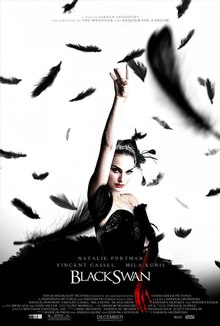 I caught up with Black Swan last week, knowing vaguely that it was a big hit in 2010/11 and that it was to do with a dancer having to discover her dark side in order to play the black swan as well as the white swan in Swan Lake. And that indeed is what it's about. Ballerina Nina Sayers (Natalie Portman) is cast as Odette, replacing a principal who has retired and is now a drinking, despairful wreck. As a dancer, Nina is technically superb, but lacking in the dangerous passion needed to portray the Black Swan convincingly. The film follows her plunging the depths of her psyche, as she responds to the role itself, a friend who may be a rival, her predecessor, a domineering mother a lustful and exacting director. Having found her darker self she has to confront it. Understandably, she falls to pieces, in a terrifying series of hallucinations and mysterious injuries. But she gives a triumphant performance. Life is sacrificed to art.
I caught up with Black Swan last week, knowing vaguely that it was a big hit in 2010/11 and that it was to do with a dancer having to discover her dark side in order to play the black swan as well as the white swan in Swan Lake. And that indeed is what it's about. Ballerina Nina Sayers (Natalie Portman) is cast as Odette, replacing a principal who has retired and is now a drinking, despairful wreck. As a dancer, Nina is technically superb, but lacking in the dangerous passion needed to portray the Black Swan convincingly. The film follows her plunging the depths of her psyche, as she responds to the role itself, a friend who may be a rival, her predecessor, a domineering mother a lustful and exacting director. Having found her darker self she has to confront it. Understandably, she falls to pieces, in a terrifying series of hallucinations and mysterious injuries. But she gives a triumphant performance. Life is sacrificed to art.Lots of familiar topoi, then: dangerous obsession (like Pi, the only other Aronofsky film I've seen), dance as a means for a good girl to find her wild side (pick any teen dance movie, Dirty Dancing, Step-Up etc.), a Jekyll & Hyde theme, a gothic collage of madness and suspicion (Shutter Island). It's all good material and there's nothing wrong with using it again. But Black Swan didn't seem to me to make something interestingly new with its parts. The mise-en-scene was a bit obvious. Visually, there was the black / white symbolic design, the predictable use of mirrors to suggest multiple identity, the crude imagery of mutilation. Too many characters were types: the obsessive mother, a former dancer who never made it, succeeding vicariously through her daughter; a director who is sexual predator but also a genius driving his artistes to dangerous extremes; a friend who may be enemy. The script had too many clichés about getting in touch with your dark side, letting go etc.
But my real problem with Black Swan was that it was unequal to the themes it was exploring. The White Swan self is here equivalent to being rigid, sexually repressed and enslaved to authority - a hopelessly inadequate version of the Goodness and Beauty she represents in Swan Lake. Similarly, the Black Swan consists in clubbing, popping pills and lesbian sex. Next to the ballet itself this seems a blinkered, narrow and smug modern metro view of the psyche. And since Nina is a train crash at the start of the film (how did she make it this far in the company?), there is nothing for the narrative to do but show us the bits fall off. It's misery porn, equivalent to watching a cancer take over this system, with dramatic scenery and a few pat statements to justify it as a serious look at the demands of art. And more basically, the problem of making a film about Swan Lake is that it's always going to fall short of the original. Tchaikovsky goes much further into the heights and depths of emotion than this. Black Swan is, I think, well-intentioned, brilliantly acted and has some fine set pieces. But I'm not sure it takes us anywhere. Still, I would note that the day after I saw it, I read about Segei Polunin, young superstar, suddenly leaving the Royal Ballet. Pressure amounting to madness? Apparently he is bored, needs time to think, doesn't like London. Hard to see a film in that.